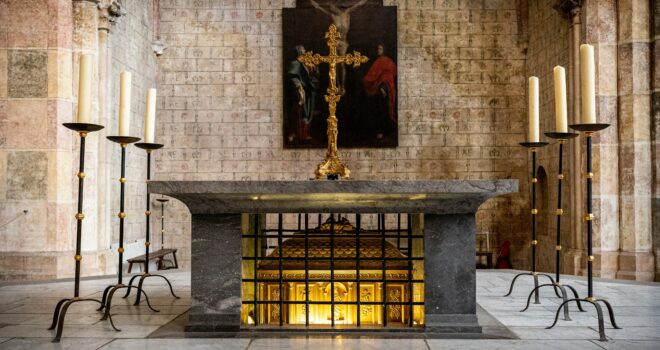Throughout his theological career, Saint Thomas Aquinas named six reasons why people should pray to “lesser saints.” These six reasons can help strengthen our devotions to the saints and pray to them better.
To begin, we should explain what Aquinas means by a “lesser saint.” A “lesser saint” is not a derogatory term. Instead, it is just a note that, in heaven, some of the saints are better than others. Some saints are holier than others – some share in God’s inner life more than others. This does not leave the “lesser saints” lacking. St. Theresa of Lisieux famously explained this mystery in her autobiography by using the image of two cups, a small cup and a large cup. If you fill both with water, they are equally full, but one (the large cup) holds more water. All the saints are completely happy and fulfilled, but some are more blessed than others.
The first reason Aquinas gives is that the biggest factor in our prayer being answered is the strength of our devotion to the saint whom we pray to. Aquinas writes, “First, from the fact that at times someone has a greater devotion to a lesser saint than to a greater one, and the effect of prayer depends mostly on devotion” (In IV Sent. d. 45, q. 3, a. 2, ad 2). Aquinas says this is more important than the third reason he mentions (some saints are patrons of certain causes). So, although some saints have great power in particular cases, we should pray to the saint towards whom we have the greater devotion, since that is the greatest factor in our prayers being answered. Also, if we want our prayers answered, we should strengthen our devotions.
The second reason to pray to lesser saints, “to take away boredom” is funny and insightful (In IV Sent. d. 45, q. 3, a. 2, ad 2). It shows that St. Thomas was not a dry, logic machine – as sometimes people think based on his precise theology. Instead, like most of us, he had trouble focusing during prayer. Also, it is a helpful solution to our lack of focus during prayer – pray differently. Praying differently takes us out of comfortable habits and rekindles our attention.
The third reason, as already mentioned, is patron saints, “Third, because it is given to some saints to be particular patrons in certain special causes” (In IV Sent. d. 45, q. 3, a. 2, ad 2). We have already seen that the strength of our devotion is a more important factor in our prayers being answered. So, if we want to invoke the saint who is the patron for our cause, we should develop some devotion towards that patron saint. We should learn about their life, read what they wrote, admire their virtues and victories, and show them some honor.
The fourth reason to pray to lesser saints, “so that due honor may be shown to all of them,” is also important (In IV Sent. d. 45, q. 3, a. 2, ad 2). It shows that all the saints are great and deserve our respect. Praying to them is a matter of justice, especially if your prayers have been answered through their intercession. Aquinas is himself a model for this. Once he prayed to St. Agnes and asked her to cure his friend Reginald, and it worked. Then, he started giving his students a celebratory meal on her feast day. So, it is good to honor the saints – they deserve our respect. One can honor them by venerating their relics and by asking for their intercession.
The fifth reason to pray to the lesser saints is reminiscent of Jesus’s teaching to pray continually. It is that “because sometimes something is obtained by the prayers of many that would not be obtained by the prayers of one person” (In IV Sent. d. 45, q. 3, a. 2, ad 2). This should remind us of two of the parables in the Gospel. First is Luke 11:5-8, the story of the neighbor who keeps knocking until his friend gives him bread. Second is Luke 18:1-8, where the unjust judge finally gives the widow her due because she wore him down with repeated requests. In order to teach us patience and longevity in prayer, sometimes God will not answer our prayers for a long time – and sometimes we ask for things we shouldn’t.
The sixth reason to pray to the lesser saints is that sometimes “God wishes to make known their sanctity” by answering prayers we offer through the saint (STh II-II, q. 83, a. 11, ad 4). This was taken up in the process of canonizing new saints. C.S. Lewis (an Anglican) once weighed in on the discussion that the Anglican church might start canonizing saints. He asked how the knowledge that a person was in heaven could be attained (God in the Dock, Letters, #10 “Canonization”). Clearly it could not be known by human means. God reveals this by answering prayers made through the intercession of the person.
Aquinas mentions another important thing about praying to the saints. He teaches that there are two different ways of addressing prayer in general:
“First, as to be fulfilled by him, second, as to be obtained through him. In the first way we offer prayer to God alone . . . But in the second way we pray to the saints, whether angels or men, not that God may through them know our petitions, but that our prayers may be effective through their prayers and merits” (STh II-II, q. 83, a. 4, co).
This is a crucial distinction to keep in mind. Indeed, confusing it risks giving worship to the saints if we pray to them as if they would fulfill our prayers. It was this very error that postponed St. John Henry Newman’s conversion. Before his conversion, when he was an Anglican, St. John Henry Newman thought that direct invocation of the saints was idolatrous. He called the practice of praying to the saints, “Romanism or Popery” (Via Media ii, 371). He thought these practices gave the saints too much honor because, by directly addressing the person, they seemed similar to worship due to God alone (Via Media ii, 385). Once Newman recognized this distinction, praying to someone so that our prayers can be fulfilled by that person (God alone) or through that person (the saints), he was able to join the Catholic Church.
Aquinas reminds us that not everything is about us. If we want our prayers to be answered, then we must have authentic devotion towards the saints and recognize that it is God who ultimately answers our prayers through the saints. We must not be utilitarian in our devotions towards the saints.
But also, we should recognize that asking the saints to intercede for us can help them – it can reveal their holiness and remind us of their power and merits. Also, Aquinas says that “it pertains to the saints’ glory that they provide assistance for salvation to those in need; for this is how they are made cooperators with God” (In IV Sent. d. 45, q. 3, a. 1, co). By letting the saints intercede for us, we allow them to participate in God’s action of saving us, a great honor for them – but that is a topic for another day.
Photo by Nick Castelli on Unsplash










